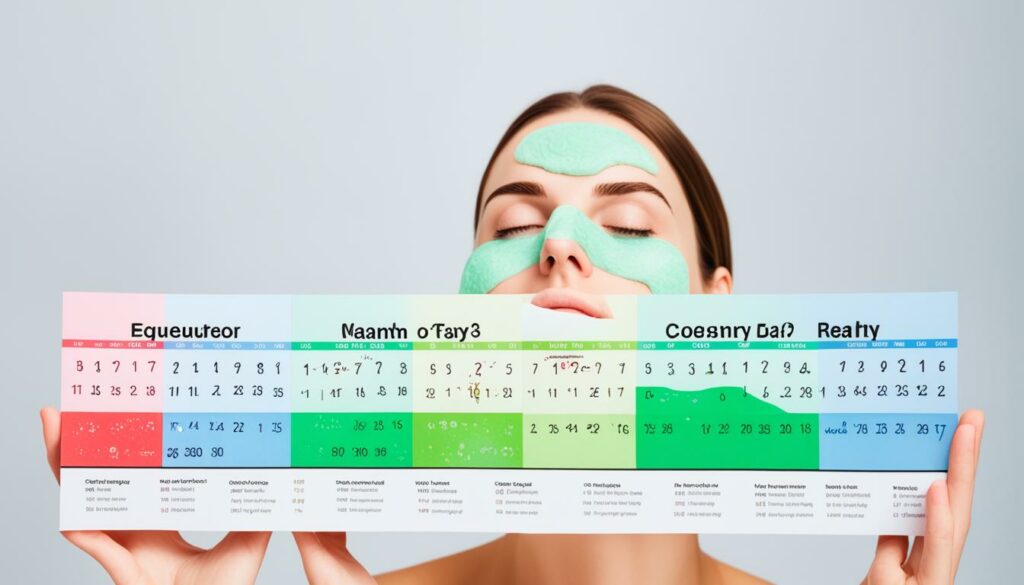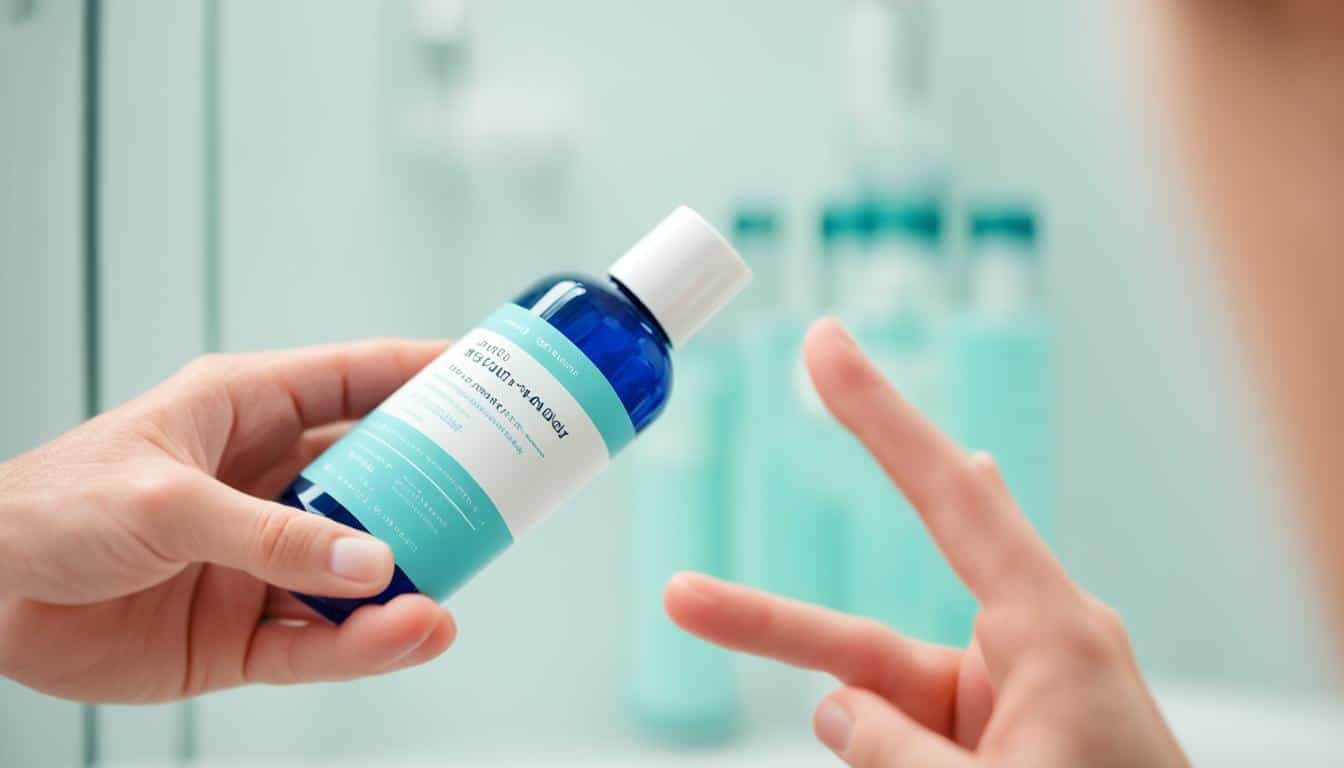When it comes to managing acne, one of the key steps in your skincare routine is washing your face. However, finding the right frequency for face washing is crucial to effectively control breakouts without causing further irritation. In this article, we will explore the optimal face washing frequency for acne-prone skin and provide recommendations for the best face wash for acne.
Key Takeaways:
- Wash your face twice a day, once in the morning and once at night, to remove excess oil, dirt, and bacteria.
- Avoid overwashing your face, as this can disrupt the skin barrier and worsen acne.
- Choose a gentle cleanser specifically formulated for acne-prone skin.
- Avoid harsh exfoliants and opt for products with ingredients like salicylic acid or benzoyl peroxide.
- Consult with a dermatologist for severe cases of acne or persistent breakouts.
The Misconception of Overwashing
When it comes to acne skincare routine, there is a common misconception that washing your face frequently can eliminate or reduce acne. However, this belief is not entirely accurate and can lead to unintended consequences. Overwashing or using aggressive cleansing products can actually harm your skin barrier and worsen acne.
Contrary to popular belief, acne does not solely result from oil and dirt accumulation. Breakouts are triggered by various factors, including bacteria and hormones. In fact, stripping away essential oils from the skin can lead to an overproduction of sebum, clogging pores and causing inflammation and more breakouts.
To effectively manage acne, it is important to adopt best practices for washing face with acne. Start by using a gentle cleanser specifically formulated for acne-prone skin. Avoid scrubbing your face vigorously or using harsh exfoliants that can further irritate your skin.
“Overwashing or using aggressive cleansing products can actually harm your skin barrier and worsen acne.”
Look for cleansers that contain acne-fighting ingredients like salicylic acid or benzoyl peroxide. These active ingredients help target and prevent breakouts by unclogging pores and reducing inflammation.
When washing your face, it’s essential to be mindful of signs of overwashing. These signs may include flakiness, excessive dryness, increased oil production, redness, tightness, and increased skin sensitivity. If you experience these symptoms, it’s crucial to reassess your skincare routine and make adjustments.
Prioritizing the health of your skin barrier and using a gentle cleanser designed for acne-prone skin can help maintain a clear complexion. By dispelling the misconception of overwashing and adopting the right approach, you can effectively manage acne and achieve healthier skin.
Finding the Right Cleanser for Your Skin Type
The right cleanser plays a crucial role in maintaining healthy and clear skin. For individuals with acne-prone and oily skin, it is important to choose cleansers that can effectively remove excess oil without stripping the skin’s essential oils. Foaming cleansers are an excellent option as they can help remove the excess oil while leaving the skin feeling clean and refreshed. Additionally, water-based moisturizers that contain ingredients like hyaluronic acid can help hydrate the skin without adding more oil.
When selecting a face wash for acne-prone skin, it is recommended to look for products that are specifically formulated for this skin type. Here are some recommended cleansers:
- CeraVe Acne Control Face Cleanser
- Cetaphil Gentle Clear Clarifying Acne Cream Cleanser
- La Roche Posay Effaclar Acne Face Cleanser
- Avene Cleanance Cleansing Gel
For individuals with combination skin, similar cleansing practices can be followed, adjusting the frequency based on the dryness or flakiness of different areas of the face. Dry and sensitive skin types should opt for hydrating face washes that contain ingredients like hyaluronic acid and aloe vera to prevent the skin from drying out further. Micellar water can also be a gentle and effective option for cleansing dry and sensitive skin.
The key to managing acne and preventing further breakouts is choosing the right cleanser that is tailored to your skin type. By selecting the appropriate face wash, you can effectively cleanse your skin without exacerbating any existing skin concerns.
The Consequences of Overwashing and Under-washing
Overwashing or under-washing your face can have negative consequences for acne-prone skin. Let’s delve into how each of these habits affects your skin.
The Effects of Overwashing
If you wash your face too frequently, you may be stripping away the skin’s natural oils and disrupting its protective barrier. This can lead to dryness, redness, and irritation, making your skin produce more oil in response. Ultimately, this can worsen acne breakouts and compromise the health of your skin.
It’s crucial to find a balance and refrain from overwashing to maintain a healthy skin barrier. Gentle products specifically formulated for acne-prone skin can help cleanse your face without causing dryness, leaving your skin feeling clean and refreshed.
The Dangers of Under-washing
On the other hand, not washing your face enough can lead to clogged pores. When dirt, oil, and bacteria accumulate on your skin, it can result in the formation of acne-causing bacteria and blockage of pores. This can trigger further breakouts and worsen existing acne.
Therefore, it’s important to wash your face regularly to remove impurities and excess oil. Washing your face twice a day, in the morning and evening, is generally recommended. However, if you engage in activities that leave your face dirty or you sweat heavily, an additional cleanse may be necessary to prevent clogged pores.
When washing your face, opt for gentle products that effectively remove impurities without drying out your skin or stripping it of its natural oils. Avoid harsh soaps or cleansers that can disrupt the skin’s balance and aggravate acne.
Striking the Right Balance
By maintaining a balanced approach to face washing, you can effectively manage acne-prone skin. Here are some key points to remember:
- Wash your face twice a day: Cleansing in the morning and evening helps remove impurities and excess oil.
- Use gentle products: Look for formulations specifically designed for acne-prone skin to avoid irritation.
- Avoid overwashing: Resist the temptation to wash your face excessively, as it can disrupt the skin barrier.
- Prevent clogged pores: Regular washing helps prevent the buildup of dirt, oil, and bacteria that can block pores.
By adhering to these guidelines, you can maintain a healthy skin barrier while effectively managing acne breakouts.

Now that we understand the consequences of overwashing and under-washing, let’s explore the role of cleansing in acne treatment in the next section.
The Role of Cleansing in Acne Treatment
Cleansing is a fundamental step in an acne treatment routine. While washing your face helps remove dirt, excess oil, and makeup, it’s important to note that water and simple soap or face wash alone are not enough to clear up acne. Cleansing should be followed by the use of acne treatment products, both over-the-counter and prescription, to effectively manage breakouts.
Over-the-counter acne products containing ingredients like salicylic acid and benzoyl peroxide can be beneficial for mild breakouts. These products should be used regularly for a few weeks to assess their effectiveness.

Facial scrubs can also help exfoliate the skin, but it’s important to avoid harsh scrubs that can irritate and worsen acne.
In more severe cases, prescription acne medications like adapalene, tretinoin, and tazarotene may be necessary. It’s important to apply acne medications to freshly washed and thoroughly dried skin for optimal results. Consulting with a healthcare provider or dermatologist is recommended for personalized acne treatment plans.
Conclusion
Finding the optimal face washing frequency is crucial for effectively managing breakouts and maintaining clear skin for those with acne-prone skin. Dermatologists generally recommend washing your face twice a day, in the morning and evening, to remove impurities, excess oil, and bacteria that can contribute to acne. However, it is important to find the right balance and avoid overwashing, as this can disrupt the skin barrier and lead to more breakouts.
To manage breakouts effectively, it is essential to use a gentle cleanser specifically formulated for acne-prone skin. Harsh cleansers and aggressive exfoliants can irritate the skin and worsen acne. Additionally, incorporating other measures into your acne skincare routine can further help minimize breakouts. These measures include avoiding touching your face, using a clean towel to dry your face, moisturizing with oil-free products, changing your pillowcase weekly, maintaining a healthy lifestyle, and considering professional treatments if necessary.
Prioritizing the health of your skin barrier is crucial in managing breakouts. It is important to be gentle with your skin, avoid harsh products, and consult with a dermatologist for severe or persistent acne. By following these guidelines and establishing an effective acne skincare routine, you can achieve a clear complexion and feel confident in your skin.
FAQ
How many times should I wash my face if I have acne?
Dermatologists recommend washing your face twice a day, once in the morning and once in the evening, to effectively manage breakouts. However, additional cleansing may be necessary if you sweat heavily or engage in activities that make your face dirty.
What is the best face wash for acne-prone skin?
Some recommended cleansers for acne-prone skin include CeraVe Acne Control Face Cleanser, Cetaphil Gentle Clear Clarifying Acne Cream Cleanser, La Roche Posay Effaclar Acne Face Cleanser, and Avene Cleanance Cleansing Gel. It’s important to choose a gentle cleanser specifically designed for acne-prone skin.
How often should I cleanse acne-prone skin?
It’s recommended to wash your face twice a day, in the morning and evening, to remove impurities, excess oil, and bacteria. However, additional cleansing may be necessary if you sweat heavily or get dirty.
Can overwashing worsen acne?
Yes, overwashing can disrupt the skin barrier, irritate the skin, and potentially worsen acne. It’s important to find the right balance and avoid washing your face too frequently or using aggressive cleansers.
What are the consequences of overwashing or under-washing my face?
Overwashing can strip away the skin’s natural oils, leading to dryness, redness, increased oil production, and potentially more breakouts. Under-washing can result in clogged pores due to the accumulation of dirt, oil, and bacteria.
Is cleansing important in acne treatment?
Yes, cleansing is a fundamental step in an acne treatment routine. It helps remove dirt, excess oil, and makeup. However, cleansing alone is not enough to clear up acne. It should be followed by the use of acne treatment products, both over-the-counter and prescription, for effective management.









